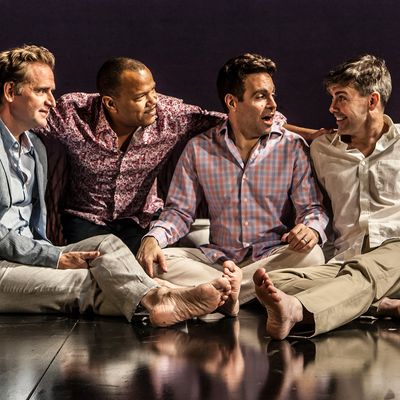
How many Steves does it take to screw up a marriage? Steven and Stephen are a long-term couple with an 8-year-old son and intimacy issues. Steven’s old friend Matt, and Matt’s partner, Brian, are pushing the boundaries of fidelity with (among others) their trainer, Steve. When the two couples and their lesbian sidekick, Carrie, meet to celebrate Steven’s 47th birthday at a nice Manhattan restaurant, it isn’t long before the betrayals spill and the table settings end up on the floor — but not to worry. There to clean up the mess is young Argentine waiter-slash-dancer Esteban, who soon joins this recombinant ménage. If it’s hard to keep all of the Steve-variants straight, well, you don’t have to; none of them is.
There’s another Steve, too, hovering godlike above the ones directly referenced in Mark Gerrard’s sad and hilarious — sadlarious? — new play, naturally called Steve and feelingly directed by Cynthia Nixon for the New Group. That would be Stephen Sondheim, whose pungent lyrics are invoked so frequently that you may feel you’ve been transported from the Signature Center to an endless Name That Tune night at Marie’s Crisis. It was, in fact, at a “slop and sing” eatery not unlike that Village piano bar that Steven, Matt, and Carrie first met, as young waiters themselves, while pursuing unsuccessful careers in the arts. (For about 15 minutes before the curtain, they warm up the audience by belting standards like “Two Lost Souls” and “Bosom Buddies.”) Now they carry around the detritus of that existence like shrapnel, or artillery; fans of Elena Roger, Madonna, Evita, Kristin Chenoweth, Mame, and Amy Adams beware. And if you don’t know why every utterance of the phrase “Once upon a time” merits the Pavlovian response “I wish,” you need to reread your signed copy of Finishing the Hat.
That’s all well and good; Steve may be the gayest tragicomedy since The Boys in the Band, with which it surprisingly shares a sensibility. That the Steves take marriage and even children for granted, let alone equal opportunity and social acceptance, does not make as much of a difference as you might expect. Bookending gay liberation, the two plays both seem to be getting at something in gayness that transcends time and is unhooked from oppression. In Boys in the Band, that classic 1968 bitch-fest, even the more liberated characters are deeply self-loathing; in Steve, after nearly 50 years’ advances ought to have made a huge difference, they are, if less self-loathing, no happier. Neither parenting nor promiscuity, families of choice nor families of obligation, professional achievement nor constant self-improvement has neutralized the acid of doubt eating away at them; at one point Steven wonders if all the banter with which they have entertained themselves for years is “just noise,” keeping them from “ever actually accomplishing anything.” They are, he says memorably, passengers on “a jaunty gay Raft of the Medusa.”
Whether this sense of uselessness and doom persists after all these years because the Steves — all old enough to be survivors of the AIDS epidemic — are part of a Moses generation, fated to see but not live in the promised land, is a question left unanswered except by implication; Estaban, a poor immigrant racing among menial jobs and volunteer work on a pediatric-oncology ward, lives in a blur of hope. He is also 20 years younger than the others; maybe they once lived in that blur, too. In any case, the blur has burned off, leaving the play with very little to do but tread water frantically, its characters throwing out lifelines of wit to no one on shore. In compensation, Gerrard, whose only previous play seems to be called Andy Cohen Has a Big Dick, gets a little hysterical, trying every distracting trick he can think of. Aside from that pre-show songfest, there’s a “rewound” scene, a scene played out in a flurry of text messages, a fake-out moment of surreality, various musical interludes, a spray of winked-at coincidences (including all those Steves), and, too patly, a tear-jerking death. They are all neatly done, both in the writing and in performance; Nixon gets lovely, layered work from the sharp-tongued cast, especially Matt McGrath as Steven, Ashlie Atkinson as Carrie, and Mario Cantone as Matt, a role that might have been custom-sewn directly onto his flesh.
But the play doesn’t really hang together; it keeps digging and darting like a squirrel trying to rediscover its acorns. (The ending is such a half-hearted whimper it necessitates a post-curtain sing-along.) As solid as Nixon’s work with the actors is, her staging has a slightly awkward, throw-everything-up-there-and-see-what-sticks quality. I suppose, in a way, that’s apt, given the way the characters improvise their lives. That relentlessness, and the narrow scope of the characters’ concerns, does get claustrophobic, though, even at 90 minutes, in a way that Peter Parnell’s sleek and serious Dada Woof Papa Hot, also about post-marriage gay identity, does not. (For one thing, Parnell’s characters are much more engaged with the world beyond their clique.) It may be that gay plays that don’t look outward are, at this point, running out of steam. In any case, I began to wonder, even as Steve amused me, whether it and the Steves share the same problem. I don’t mean the problem of being gay or surviving AIDS or living life under a leftover cloud of disapproval. It’s the problem of not having enough to say, just a way of saying it — most of which is borrowed. Sondheim was thinking about bored rich wives when he wrote “The Ladies Who Lunch,” but the point is the same; they’re dinosaurs. Also: Aren’t they a gem?
Steve is at the Signature Center through December 27.

